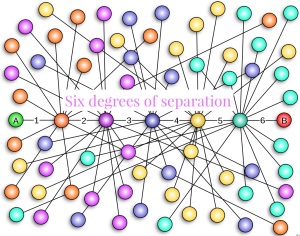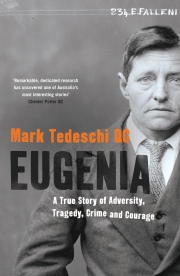 It’s the first Saturday of the month, which means it’s time to participate in Six Degrees of Separation (check out Kate’s blog to find out the “rules” and how to participate)!
It’s the first Saturday of the month, which means it’s time to participate in Six Degrees of Separation (check out Kate’s blog to find out the “rules” and how to participate)!
Because I’m in the throes of hosting Southern Cross Crime Month on this blog, I thought I’d try to stick to a theme… every book in my chain is true crime. As ever, hyperlinks take you to my full review.
This month, the starting book is…
‘Phosphorescence’ by Julia Baird (2020)
I haven’t yet read this book about finding internal happiness and appreciating the wonder of life, even though I bought it not long after it was released based on the fact that it just looked gorgeous and was a rare hardcover (most books in Australia only ever get published in paperback format).
Another book I bought, albeit many years ago, because I liked its hardcover treatment was…
‘Swamp: Who Murdered Margaret Clement?’ by Richard Shears (2008)
This large-format hardcover, which features beautiful endpapers and sepia photographs, is about the mysterious disappearance in 1954 of Margaret Clement, an eccentric recluse living in rural South Gippsland (the part of the world where I was raised), who was better known as the “lady of the swamp”. She was once a beautiful, rich socialite who was well-educated and well-travelled, but in old age was living in abject poverty in the decrepit mansion built by her father, a Scottish immigrant, who had become one of Australia’s richest men.
Another book about a Scottish immigrant in Australia fallen on hard times is…
‘The Suitcase Baby’ by Tanya Bretherton (2018)
This is the true story of Sarah Boyd, an impoverished Scottish immigrant, convicted of the murder of her three-week-old baby in Sydney in 1923. The book looks at why Boyd did what she did and asks whether her trial and subsequent punishment was fair.
Another book that looks at the fair (or otherwise) treatment of a historical crime case is…
‘Eugenia: A True Story of Adversity, Tragedy, Crime and Courage’ by Mark Tedeschi QC (2012)
Regular readers of this blog will know this isn’t the first time I’ve included this book in a Six Degrees chain, but it’s one of those true life stories that has stayed with me and often pops into mind. Eugenia Falleni scandalised Australia in 1917 when she was charged with the murder of her wife. She had been living as a man for 22 years and during that time had married twice. No one knew her true identity, not even the women whom she married — indeed, her second wife thought she was pregnant to him!
Another book about a female murderer is…
‘My Mother, A Serial Killer’ by Hazel Baron and Janet Fife-Yeomans (2018)
This book is about Dulcie Bodsworth, a community-minded wife and mother, who murdered her husband in the 1950s, then killed two other men she knew. She only came to justice after her eldest daughter, Hazel Baron, turned her into police. As well as looking at Dulcie’s complicated, shambolic and often impoverished life — from her first marriage to her third — and examining in great detail how she went about killing three men who simply got in her way, My Mother, A Serial Killer also charts how she was brought to justice. She was clearly a very troubled individual.
Another true crime book about a troubled individual is…
‘Born or Bred? Martin Bryant: The Making of a Serial Killer’ by Robert Wainwright and Paolo Totaro (2010)
In the story of the world’s worst massacre (at the time) by a lone gunman, the authors of this controversial book try to come up with a theory as to why Martin Bryant carried out the atrocity for which he was responsible: the murder of 35 people at the Port Arthur tourist site in Tasmania on April 28, 1996. This tragedy had huge repercussions on the Australian psyche, gun control and media reportage.
Another book about the Port Arthur massacre is …
‘The Media and the Massacre’ by Sonya Voumard (2016)
This book explores the relationship between journalists and their subjects in the context of the Port Arthur massacre. Its main focus is on the best-selling Born or Bred? (referenced above) and the ethical and legal dilemmas it posed to its authors, two respected broadsheet journalists, who were later sued by the murder’s mother, Carleen Bryant, after she withdrew her support for the book.
So that’s this month’s #6Degrees: from a story about finding happiness within ourselves to the complex relationship between journalists and their subjects, via a string of true crime books from Australia.
Have you read any of these books?
Please note, you can see all my other Six Degrees of Separation contributions here.








Brilliant chain Kim – well done for sticking with your theme – I like the sound of all of these!
LikeLike
Thanks 🙏 I like that you did something similiar for your Reading Ireland month
LikeLike
Well, that took a surpsingly dark turn! The relationship with the media is a fascinating one, though. Brings to mind the hacking of Milly Dowler’s phone here in the UK.
LikeLike
Well, I guess true crime by it’s very nature is dark. The media book is a fascinating one… it takes a lot of inspiration from Janet Malcolm’s Yhe Media & the Murderer. Not sure if you have read that one, but definitely one of my fave books of all time. As an ex-journo these kinds of books really resonate with me.
LikeLike
The story revealed in ‘Eugenia’ is quite extraordinary. My mind is boggled by the thought that someone could masquerade as a man for all those years and get away with it.
I see you mentioned Media and the Murderer in your reply to Susan (life in books) – I bought that one for my husband on the strength of some comments you made about this last year. I’m now waiting anxiously for him to read it so I can get my paws on it!
LikeLike
Eugenia was very clever and had all kinds of ways to convince people she was male. I can only imagine the stress she was under to keep this up for most of her life; the threat of exposure must have been overwhelming at times.
I mistakenly called it The Media and the Murderer. I meant to say The Journalist and The Murderer. Hope you get to read it at some point.
LikeLike
I hadn’t twigged that the title wasn’t quite right – didn’t matter because I still knew which book you meant
LikeLiked by 1 person
Oh my! That went dark quickly, didn’t it? Heavens! I love a good mass murder story, but I prefer to watch them on TV than read about them.
LikeLike
Lol. Well, it’s true crime, which by its very nature is dark.
LikeLiked by 1 person
Well, I wasn’t expecting to have read any of your choices, but there at the bottom was that excellent book by Sonya Voumard!
LikeLike
Well, it’s clearly an academic thesis masquerading as a book for public consumption, but yes, the Voumard is very good.
LikeLike
I thought it was terrific, very thoughtful.
LikeLike